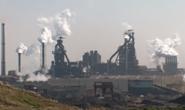Market Segment

April 26, 2016
AK Ashland Furnace Will Not Restart Anytime Soon
Written by Sandy Williams
AK Steel announced earnings on Tuesday and the big question in everyone’s mind was if AK Steel Ashland would be restarted. The answer is no, not at this time. CEO Roger Newport said the company does not want to get “hung up in the short term volatility” in the marketplace. AK Steel will be looking at supply-demand conditions domestically and globally, as well as input pricing.
“That’s what we have to be focused on, are we going to get a return on making steel? And I don’t want to just be making steel, to be selling steel. I want to make sure that we’re doing it and making a return for all of our investors. So right now the conditions haven’t changed that would have us change our mind at this point.”
Production at Middletown and Dearborn has picked up nicely in response to the Ashland shutdown with both fully utilized in first quarter, said AK Steel. The company is not purchasing any slabs in the open market and is “comfortable with what we are able to make at this time.”
For the second quarter, AK Steel expects a modest decline in shipments due to reduced exposure to the spot market as well as two planned maintenance outages. The outages at the Middletown Works hot end operations and the Dearborn Works hot strip mill, along with other routine maintenance, is expected to result in expenses of $23 million in Q2. The Middletown outage was described as a single vessel outage at the melt shop that is “nothing too significant as far as outage time.”
AK Steel reported a net loss $13.6 million for first quarter 2016. Adjusted EBITDA improved to $81.1 million from $58 million in Q1 2015.
Sales were $1.52 billion on shipments of 1,658,200 tons. Sales were 5 percent lower year over year with shipments of hot rolled carbon products down 34 percent. The combined lower volume and sales price led to the decrease in net sales from $1.75 billion in Q1 2015. The average selling price for the quarter was $914 per ton.
“We achieved significant improvement from a year ago as we made the strategic decision to reduce our exposure to commodity spot markets, optimize our footprint and focus on higher value products,” said Roger K. Newport, AK Steel’s Chief Executive Officer. Mr. Newport continued, “As a result of these actions, our continuous emphasis on operational improvements and relentless attention to cost management, our adjusted EBITDA improved significantly compared to a year ago.”
AK Steel exposure to the spot market is currently around 10 percent and a portion of contract business that fluctuates with the spot market.
AK Steel margin pressure was offset through more efficient plant operations and temporary idling of Ashland Works hot end operations. Adjusted EBITDA margin increased to 5.3 percent of sales versus 3.3 percent in Q1 2016.
AK Steel completed the final phase of an expansion project at Butler Works that will increase production capability 5 percent for its higher value grain oriented electrical steels.
On the subject of imports, Newport had the following comment during the earnings conference call:
“Dealing with a massive oversupply of steel primarily from China continues to be our focus area of our company and for the entire American steel industry. Our markets have been overwhelmed with what we believe are unparalleled rated imports. We are utilizing the existing trade laws to address this issue while actively pushing our government to strictly enforce our trade laws. We cannot and we will not sit passively by on this issue. The oversupply of steel is impacting all regions of the world and this ultimately threatens our domestic steel industry in field jobs right here in America.
“Recently I was in Washington D.C. and provided testimony to the Department of Commerce, the U.S. trade representative, and the Congressional Steel Caucus regarding current steel market conditions. My message was simple and clear; we expect our government to strictly enforce the existing trade laws and to take all necessary actions to address unfairly traded imports and the severe over capacity in the steel industry caused primarily by China. Furthermore we believe that the steel industry is critically important to the overall economic health of our country. The irony is that the steel industry in the United States has lost thousands of jobs as a result of China’s plan to keep its workers employed by continuing to produce millions of tons of steel that simply are not needed. This would not happen if countries like China were forced to play by the rules of fair trade.”
When asked if a new import surge is likely from China now that prices have increased, Newport responded, “We have seen some improvement in pricing as we’ve talked about earlier, but still the spread still have not increased to the levels that we would expect to see an increase in imports.”
“Right now I would say still the spreads, if you look at historically when you start seeing an increase in import, we have not seen the pricing spreads get to a level that would increase it and we’re still running higher levels of imports coming in today. Typically you would expect 18% to 20% something like that of our market being supplied by imports and we’re still north of that running in the mid 20s.”







